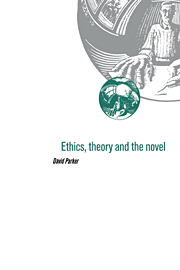Book contents
- Frontmatter
- Contents
- Acknowledgements
- Part I THE ETHICAL UNCONSCIOUS
- Part II SOCIAL BEINGS AND INNOCENTS
- Chapter 6 ‘Bound in Charity’: Middlemarch
- Chapter 7 Forgetting and disorientation in Anna Karenina
- Chapter 8 Two ideas of innocence in The white peacock
- Chapter 9 Into the ideological unknown: Women in love
- Chapter 10 Lawrence and Lady Chatterley: the teller and the tale
- Part III TOWARDS A NEW EVALUATIVE DISCOURSE
- Notes
- Bibliography
- Index
Chapter 9 - Into the ideological unknown: Women in love
Published online by Cambridge University Press: 05 November 2011
- Frontmatter
- Contents
- Acknowledgements
- Part I THE ETHICAL UNCONSCIOUS
- Part II SOCIAL BEINGS AND INNOCENTS
- Chapter 6 ‘Bound in Charity’: Middlemarch
- Chapter 7 Forgetting and disorientation in Anna Karenina
- Chapter 8 Two ideas of innocence in The white peacock
- Chapter 9 Into the ideological unknown: Women in love
- Chapter 10 Lawrence and Lady Chatterley: the teller and the tale
- Part III TOWARDS A NEW EVALUATIVE DISCOURSE
- Notes
- Bibliography
- Index
Summary
The main argument of political literary theorists against the traditional literary canon is by now perfectly familiar and more or less respectable in the academy: such works univocally speak the ideology of a hegemonic class, further silencing such groups as blacks, women, and the working class. This is why ‘surface’ ethical exposition of the good/evil binaries within canonical works is worse than useless, since it merely perpetuates and legitimates existing structures of power. Nor does psychological criticism fare much better for a political theorist such as Jameson, for this is merely a subgenre of the ethical, substituting ‘myths of the re-unification of the psyche’ for the ‘older themes of moral sensibility and ethical awareness’. The canonical texts are said to repress their ideological function, consigning it to their unconscious where it can only be retrieved by political analysis. To this extent they are mad texts, dangerously so, because, unless we are capable of analysing them politically, they can only offer, as Lennard J. Davis says, to reinforce in us ‘those collective and personal defences’ which are our ‘neurotic’ constructs of the world. Using Freud's famous essay, ‘Remembering, repeating and working through’, Davis argues that in reading novels we merely ‘repeat’ repressed narratives which, in the long run, impair our capacity to know ‘what really is’.
Just why it should be supposed that political analysis alone can confront us with non-ideological reality is rarely made clear in the criticism I have been citing.
- Type
- Chapter
- Information
- Ethics, Theory and the Novel , pp. 145 - 170Publisher: Cambridge University PressPrint publication year: 1994



